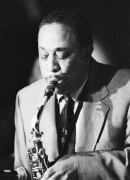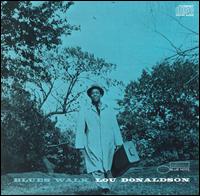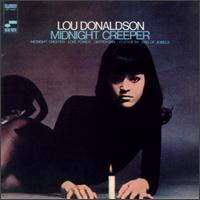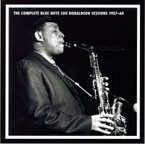

Courtesy of Lou Donaldson

Blue Note

Blue Note

Mosaic
A FIRESIDE
CHAT WITH LOU DONALDSON
Some
years back, before he passed, Andy Simpkin and I spoke about his journey
and I recall how fondly he spoke of Lou Donaldson. I told Simpkin that
most of the things I read about Donaldson are prefaced by Charlie Parker
and Simpkin matter of factly replied, "who isn't?" And that
is just it. Who isn't? Heck, in some ways, even I am and I couldn't play
an alto with four hands and a couple set of feet. Friday night being the
loneliest night of the week and I with no life, channel surfing I come
across a show on the tele and what does the guy from Homicide say to the
dead guy in Contact, a reference to how Charlie Parker was 35 and the
coroner thought he was older. Bird is the JLo of jazz. He is everywhere.
So to refer to Donaldson and Bird in the same conversation is nothing
inventive (as all writers try to be). Donaldson is Mr. Blue Note. The
alto saxophonist's Blue Note tenure is a two parter, from the early Fifties
(The Lou Donaldson Quartet/Quintet/Sextet) to the early Sixties (Midnight
Sun and Gravy Train) and then again in the late Sixties (Lush Life and
Alligator Bogaloo) to the early Seventies (Sophisticated Lou), during
which he recorded over thirty recordings. So when I heard from a little
bird that Donaldson was getting a box set (the ultimate tribute from record
labels), the first thought that sprang to mind was how on earth would
anyone be able to afford it? But the label, Mosaic (www.mosaicrecords.com),
and the reissue producer, Michael Cuscuna, are practical and alas, it
is a box set of Donaldson's Blue Note sessions from 1957-1960. I recently
saw Donaldson when he played by not so local watering hole, the Bakery,
here in Los Angeles, and I am pleased to say that he sounded fresher than
his last couple of record dates convey. Donaldson sat down with me to
talk about his Blue Note years, as always, unedited and in his own words.
FRED JUNG: Let's start from the beginning.
LOU
DONALDSON: Well, my mother was a music teacher, piano teacher and I was
around music in my childhood. I didn't want to play piano, so she bought
me a clarinet and started me on that. I loved the clarinet. I didn't like
the piano, but I loved the clarinet.
FJ: And clarinet made way for the alto saxophone.
LOU
DONALDSON: When I went into the Navy. I went to college and I was in the
marching band, but I just played clarinet. In 1945, I was drafted into
the Navy and I got in the Navy band and then I started playing saxophone.
FJ: Did you enjoy your time?
LOU
DONALDSON: I loved it. It was the best duty I ever had.
FJ: That explains a lot and why you seem to play on a lot of ocean liners.
LOU
DONALDSON: (Laughing) It was great. Then I moved to New York in 1950.
I found pretty good work. That was when I was a GI, so I was going to
GI school, which helped, helped me out financially.
FJ: How did you meet Alfred Lion?
LOU
DONALDSON: Alfred Lion, I was playing in Minton's Playhouse and he came
up with somebody and I think they just came up to check me out. Somebody
had probably told them about me and I met him up there. He came up and
asked me if I could play like Charlie Parker (laughing). He wanted a record
date and I said, "Of course."
FJ: Could you play like Charlie Parker?
LOU
DONALDSON: I tried to. Back then, everybody was trying to play like Charlie
Parker if they played alto and heard him. He was the best. What can I
say? He had a different style from everybody that preceded him. He was
more bluesy and he was just the best.
FJ: I don't hear too much of Bird on your sessions.
LOU
DONALDSON: Well, I had heard too many saxophone players before I heard
him, Fred. I heard Johnny Hodges and Benny Carter, a lot of people. Actually,
I played like Louis Jordan a little bit. Of course, Lou had a lot of hit
records out so we played them in our band. "Cleanhead" Vinson,
I had heard. So once I heard Charlie Parker, he was so dynamic, I switched
everything to that.
FJ: And Lion recorded you on sessions that became the Quartet/Quintet/Sextet
record.
LOU
DONALDSON: Yeah, he set up a date with a group that ended up being the
Modern Jazz Quartet, Milt Jackson, John Lewis, Percy Heath, and Kenny
Clarke. Later on, they became the Modern Jazz Quartet, but at that time,
it was just Milt Jackson's group. They were great too. It was great. I
was a nervous wreck of course with all these great cats. I had heard them
play and knew them, so it was good for me. Art Taylor and Gene Ramey,
that was a little later. It was great.
FJ:
You must have made an impression because you were at Rudy Van Gelder's
house quite a bit.
LOU
DONALDSON: Oh yeah, in the early and middle Fifties, I was recording quite
a bit.
FJ: How was the money?
LOU
DONALDSON: (Laughing) Not too good. We got the scale, but that is more
than you would have if you didn't make the record. We didn't have big
contracts back then. They were put together quick, so there wasn't a whole
lot of rehearsing and practicing and stuff like that. We would go over
and figure out what we were going to play and make the record. They were
around six hours and then it was all over. They didn't pay no overtime,
so you had to make that record within that time period.
FJ: Blues Walk doesn't sound like it needed overtime.
LOU
DONALDSON: Well, that's the best one I made. Oh, yeah. It is not a record
that you can critique that well because it is perfect. It is a perfect
record. What happened was we had a lot of problems, Fred, as I've told
you before, going over to Rudy's house because back then, most of these
young people don't know what was happening, but there was a lot of things
that messed up the dates. Cats would act up and a lot of them would have
to get their "vitamins" or they couldn't play, so eventually,
I got tired of that, so I told them that I was going to pick a group.
That is why you see all these guys on this record that never recorded
before. I added Ray Barretto on the conga drums to steady down the rhythm
because most of the bebop drummers were so busy, the rhythm didn't soak
through to the people. Playing nightly in clubs, I knew exactly what to
do to get that rhythm right, so I brought in Ray. Ray used to come by
and sit in with his conga and we would let him play. The rhythm was much
better with the conga added in. That is why we tried him on the date.
The record, actually, was a hit record for that time.
FJ: (I start playing Blues Walk for him) When was the last time you heard
this?
LOU
DONALDSON: Oh, I listen to that. I have it in my car in my CD player.
When I am traveling, I listen to it all the time (laughing). Sounds better
now than it did then (laughing). They redid it and remastered it and they
got it up right. It is a great record, an almost perfect record. I listen
to it. It was the epitome of jazz music. I have had people tell me that
dance groups use this record to dance. It has got a groove, a nice groove
from start to finish and it builds up within the record.
FJ: And you also recorded with the Three Sounds (Andy Simpkins, Gene Harris,
and Bill Dowdy).
LOU
DONALDSON: Yeah, I brought them to New York myself to Blue Note. I met
them in Washington and I talked Lion into bringing them into New York
and I recorded with them. They sounded good and I knew they were going
to be good. I knew they were going to be great. I used to work right across
the street from where they played, so we would go over when we weren't
playing and they would come over when they weren't playing. We got together.
FJ: Having played with Blue Mitchell, Bill Hardman, Donald Byrd, and Kenny
Dorham, who was your choice trumpeter?
LOU
DONALDSON: All of them are about the same. I played with Tommy Turrentine
and Donald Byrd. All the guys kind of fell into the groove. I probably
made the best records with Blue, but all of them kind of fell into the
groove. I had groups then. I had several groups. I had one group with
Horace Parlan, George Tucker, Al Harewood, and Bill Hardman and we worked
together and we played and we tried out this material in the clubs to
see if it would work, see if people liked it and if they did, then we
recorded it. So we kind of were doing on the job training there.
FJ: Your tenure with Blue Note was two part, because after a handful of
years, you returned to record one of my favorites, The Midnight Creeper.
LOU
DONALDSON: Well, that is a great record. See at that time, Blue Note had
been sold to Liberty and they had a big record company and they were still
operating it, Al Lion and Frank Wolff, but you had big business people
in there then and the money got better, but they also wanted a more commercial
type music to try to compete with other kinds of music. So it was a little
different period then.
FJ: So until the Eighties you were Mr. Blue Note.
LOU
DONALDSON: Yeah, except the early part when they had the Dixieland. At
first, they just had Dixieland. (Laughing) A lot of people call me that,
Blue Note Lou (laughing).
FJ: How is your health?
LOU
DONALDSON: My health is all right. I got a little cold right now because
I was on a ship for two weeks and I stayed in Florida for one week and
when I came back here, I caught a little cold. Other than that, I'm all
right. I was playing Norwegian. We went down the coast of Mexico and then
to Miami. It was a great trip with a lot of good musicians and my friends
that I don't see but once a year.
FJ: And the future?
LOU
DONALDSON: Next week, I am playing the Village Vanguard and then I am
playing Lincoln Center. I've got enough to do to keep me busy.
FJ: I'll make some calls to get you recording for Blue Note again.
LOU
DONALDSON: Well, a lot of people want me to do that. I saw Bob Belden,
he is one of the producers, and he said that it was a shame that they
haven't made a record with me because they are re-releasing all my old
records and they are outselling the ones they're making (laughing). It
would be a good idea to call on me again.
FJ: That's because you're Blue Note Lou.
LOU
DONALDSON: I hope so. Tell your audience that when they put them out to
buy these records because I need the money (laughing).
Fred Jung is the Editor-In-Chief and is Fosters for beer. Comments? Email
Him